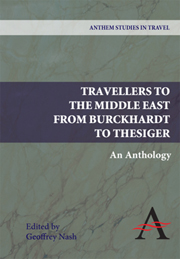Book contents
- Frontmatter
- Contents
- Acknowledgements
- Introduction
- PART ONE THE COMING OF EMPIRE 1800–1879
- The Ottoman Empire and Egypt
- Arabia
- 1 Travels in Arabia
- 2 Travels in Arabia
- 3 Personal Narrative of a Pilgrimage to Al-Madinah and Meccah
- 4 Narrative of a Year's Journey Through Central and Eastern Arabia
- 5 A Pilgrimage to Nejd
- 6 Travels in Arabia Deserta
- Persia
- PART TWO COLONIALISM AND RESISTANCE 1880–1950
- Bibliography
6 - Travels in Arabia Deserta
from Arabia
Published online by Cambridge University Press: 05 March 2012
- Frontmatter
- Contents
- Acknowledgements
- Introduction
- PART ONE THE COMING OF EMPIRE 1800–1879
- The Ottoman Empire and Egypt
- Arabia
- 1 Travels in Arabia
- 2 Travels in Arabia
- 3 Personal Narrative of a Pilgrimage to Al-Madinah and Meccah
- 4 Narrative of a Year's Journey Through Central and Eastern Arabia
- 5 A Pilgrimage to Nejd
- 6 Travels in Arabia Deserta
- Persia
- PART TWO COLONIALISM AND RESISTANCE 1880–1950
- Bibliography
Summary
With clergymen for father and maternal grandfather, and a navy tradition to boot, Doughty's family background seemed to predetermine him to a life of patriotic service and religious earnestness. But while these influences would leave their imprint on his life, other contingencies arose to conflict with them. He was an orphan by the age of six, developed a stammer, and his faith was confronted by doubts raised by his study of geology. The speech impediment barred him from a naval career and despite graduating from Cambridge with a natural science degree in 1865 this was not good enough for him to take his scientific work further. After literary study in England and travel in Europe, during which he laid the foundations for his later preoccupation with a literary style purged of modern adulteration, Doughty spent the period 1874–78 in the East. Having prepared himself by studying Arabic, he set off from Damascus in November 1876 with the intention of being the first European scholar to describe the carved monuments of Madain Salih. He accompanied the hajj as far as its vicinity, viewed and made notes on the site, but then instead of returning determined to continue his wanderings in Central Arabia. Attaching himself initially to the Fukara Bedouin, he went on to Ha'il, where he met Muhammad ibn Rashid, and thence to Khaybar, before turning back towards the Hijaz. Not far from Mecca he came perilously close to being murdered by a fanatic, but eventually arrived in Jeddah in August 1878.
- Type
- Chapter
- Information
- Travellers to the Middle EastAn Anthology, pp. 78 - 86Publisher: Anthem PressPrint publication year: 2009



